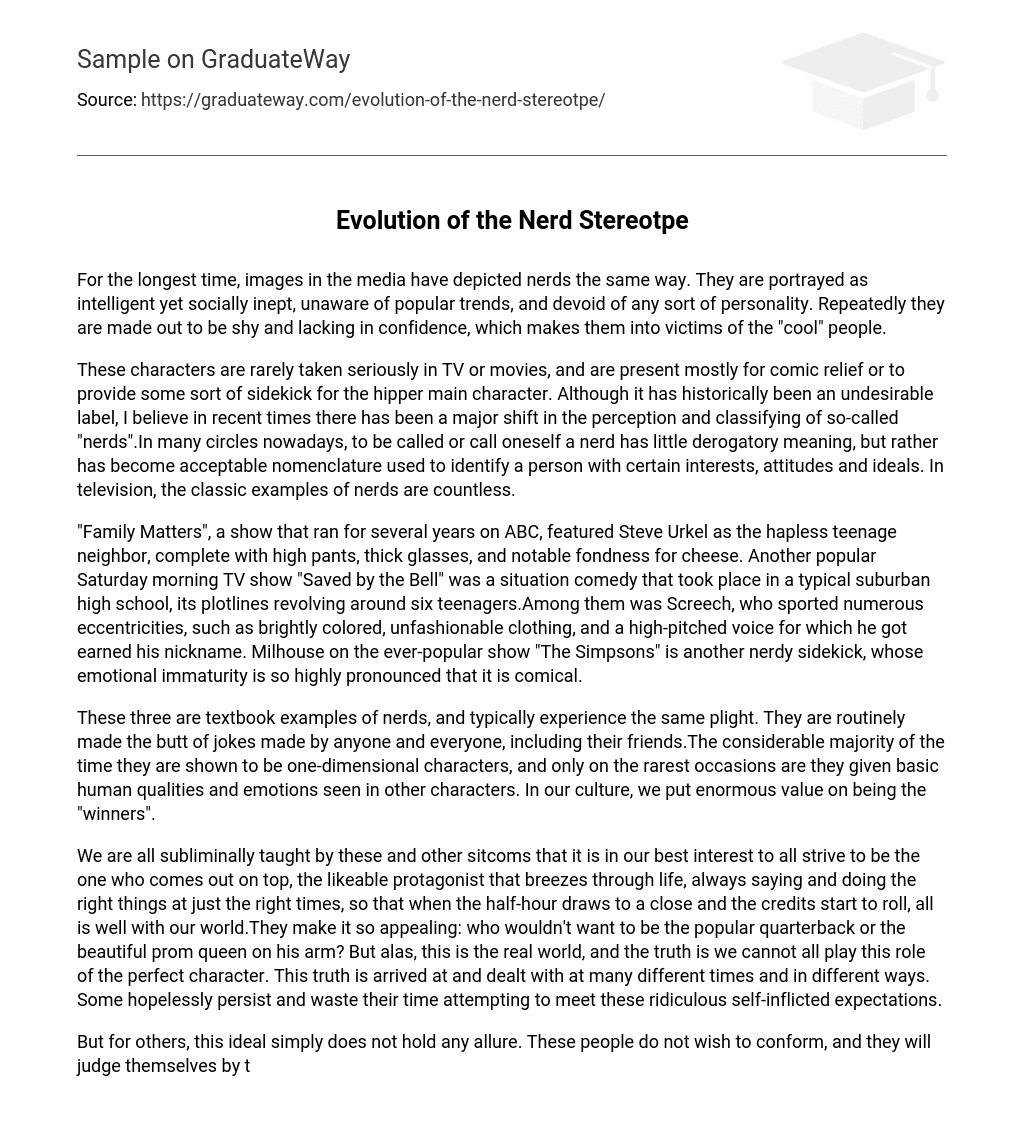The media has consistently depicted nerds as intelligent but socially awkward individuals who are oblivious to popular culture and lack personality. They are frequently portrayed as shy and lacking confidence, constantly seen as inferior to the “cool” people.
There has been a shift in the portrayal and perception of TV and movie characters who are depicted as not serious and used for comic relief or as sidekicks to cooler main characters, commonly referred to as nerds. In the past, being labeled a nerd carried negative implications, but there has been a significant change in how nerds are currently viewed and categorized. Nowadays, being called or identifying oneself as a nerd is no longer considered offensive; instead, it is seen as an acknowledgment of someone with distinct interests, attitudes, and values. The television industry showcases numerous examples of iconic nerds.
The popular TV show “Family Matters” aired on ABC for several years and showcased Steve Urkel as the clumsy teenage neighbor, known for his high pants, thick glasses, and love for cheese. “Saved by the Bell,” another beloved Saturday morning program, was a situation comedy set in a typical suburban high school, focusing on the lives of six teenagers. Among them was Screech, characterized by his peculiarities such as brightly colored, unfashionable clothes and a high-pitched voice that earned him his nickname. On the long-running show “The Simpsons,” Milhouse serves as another nerdy sidekick whose emotional immaturity is exaggerated to the point of being humorous.
These three individuals exemplify textbook nerds and face similar struggles. They are frequently the targets of jokes from various individuals, even their friends. Most of the time, they are portrayed as flat characters, with seldom opportunities to exhibit relatable human qualities and emotions found in other characters. Our society greatly emphasizes the importance of being “winners”.
We are unconsciously taught by sitcoms that it is in our best interest to strive to be the protagonist who always succeeds, says and does the right things, so that when the show ends, everything is fine. They make it appealing: who wouldn’t want to be the popular quarterback or the prom queen? However, in reality, not everyone can be this perfect character. People realize and deal with this truth at various times and in different ways. Some persistently waste their time trying to meet these unrealistic expectations.
Nevertheless, certain individuals opt out of adhering to societal conventions and instead abide by their own principles. They derive pleasure from remaining authentic to their true selves, regardless of society’s perception of specific aspects of their existence as “uncool.” These people have wholeheartedly embraced and transformed the conventional “nerd” stereotype into an intentional means of self-assertion within a distinct and thriving subculture.
Simply put, it is considered fashionable to be unconventional. Nowadays, it is increasingly common to find individuals who proudly identify as nerds. These individuals share a common belief in rejecting popular trends, both consciously and unconsciously. Many of them disregard current fashion trends and expensive clothes, opting instead to shop at their nearby thrift stores.
Instead of engaging in football or basketball, these individuals might choose to participate in mini-golf or play video games in order to satisfy their competitive instincts. Moreover, they disregard the influence of mindless entities such as MTV that impose the latest trends in popular culture. Instead, they find enjoyment in watching the Discovery Channel or immersing themselves in a good book. The self-proclaimed nerd’s core values are far more significant than their superficial traits.
In contemporary society, intellectual prowess and comprehension of theoretical matters are no longer a source of shame; rather, they are greatly esteemed. The acceptance of personal growth in diverse aspects is more prevalent nowadays compared to previous times. Men can now be less concerned about projecting excessive masculinity and can feel more comfortable displaying emotions and sensitivity. This is especially evident in the realm of artistic creativity.
There has been a surge in the popularity of a melodic music genre known as “nerd rock,” which showcases bands such as Ultimate Fakebook and Weezer. These bands specialize in singing about everyday life and the experience of feeling like an outsider, forming a strong bond with their fans. What sets this genre apart is its genuine nature, contrasting with other genres that may come across as pretentious. The artists within this sub-genre are referred to as the “new nerds” and they no longer conform to the stereotype of socially awkward outcasts. They never had any intention of challenging or identifying themselves with this stereotype.
People gradually grew tired of trying to understand the superficial and unsatisfying dominance of popular culture, leading them to unintentionally adopt a more comfortable and authentic way of behaving. Mocked by others who hoped labeling it as “uncool” would encourage conformity, individuals instead embraced their own uniqueness, even if it meant being labeled as nerds. Over time, this term lost its negative connotation.
Society has transitioned from fearing the stereotype to wholeheartedly embracing it in recent years.





